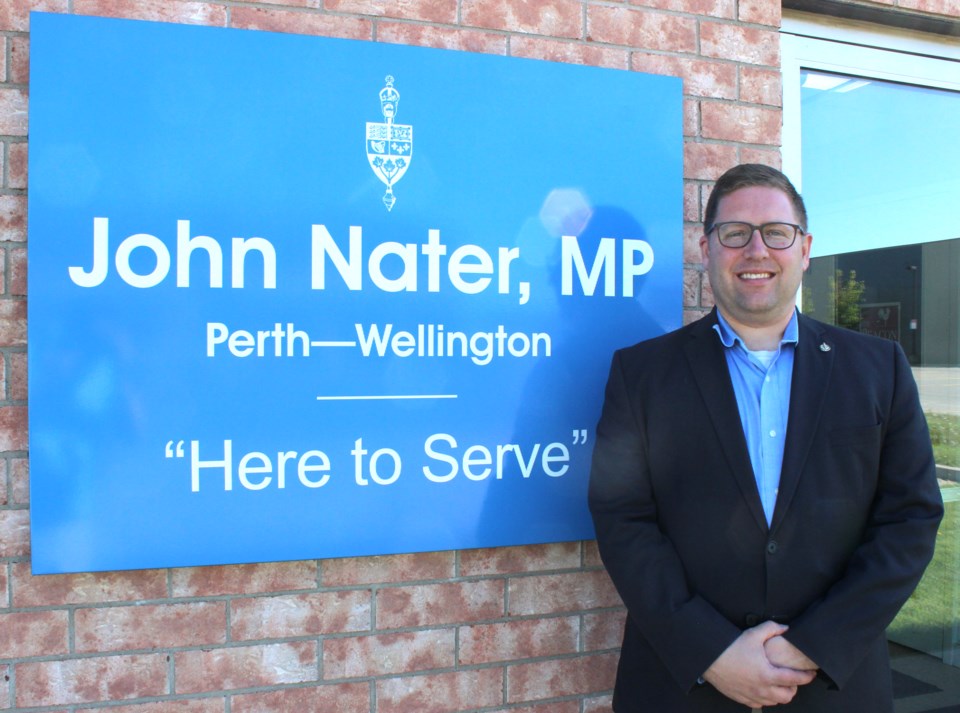Perth-Wellington MP John Nater finds himself in the spotlight as vice-chair of a House of Commons committee expected to meet in the next few weeks with David Johnston, the federal government's special rapporteur on foreign interference.
The big question the procedure and house affairs committee will ask is why Johnston has not called for a public inquiry.
Johnston spent several months reviewing information about alleged foreign interference and threats against public officials and produced an initial report, however, he stopped short of recommending a public inquiry, noting classified information needs to stay secret.
Media have highlighted allegations of Chinese interference in the 2019 and 2021 federal elections as well as threats against lawmakers, including Nater's riding neighbour and Conservative colleague, Michael Chong, MP for Wellington-Halton Hills.
"I still think we need an independent judicial inquiry to get to the bottom of things," Nater said during an interview at his constituency office in Stratford on Friday.
Nater said he respects Mr. Johnston's commitments to his country but said he is not a judge, does not have supoena powers, can't compel information and can't disclose certain information due to the nature of the investigation and national security considerations.
Johnston found in his first report that a formal commission of inquiry would be held mostly behind closed doors. The Inquiries Act says the government can appoint commissioners who have the subpoena power to compel testimony. They can require written and oral evidence, and they can require witnesses to swear to an oath. They can also demand that the government or other parties produce documents for them to examine.
That is not good enough, Nater said.
"Obviously, when you are dealing with intelligence, when you are dealing with national security, there does have to be certain safeguards in place. I am not disagreeing with that at all. We have seen different judicial inquiries in the past...that have come out with reports where all Canadians got to see what happened."
"He is hamstrung, handcuffed from (talking about) a lot of things that a lot of Canadians want to hear."
The procedure and house affairs committee deals with the "nuts and bolts of parliament", Nater said, tasked with keeping an eye on the way things work in the House of Commons. Another responsibility is anything related to the Canada Elections Act. Up until November, when media reports alleged foreign countries could be interfering in Canada's federal elections, that part of the committee's work focused on electoral redistribution, looking at new electoral maps across Canada.
Since the allegations dropped, Nater said the committee has been knee-deep in meetings, hearing from a wide variety of witnesses, including security and intelligence experts, as well as Canadians who have been targeted by foreign government. As more information is logged, some witnesses, including from Canadian Security Intelligence Service (CSIS) have been recalled several times, he noted.
"We are trying to find out what happened, when it happened, where it happened and who was influenced," Nater explained.
It is alleged that family members of Chong, the shadow minister for foreign affairs, were targeted and threatened in Hong Kong. Nater said an apparatus of the government was aware of it for more than two years, yet the MP was never informed about allegations against himself or his family members.
Prime Minister Justin Trudeau said he learned of the allegations through a Globe and Mail story while CSIS has stated the threat did not warrant informing the minister of public safety or the prime minister.
Nater said that multiple MPs have been targeted and the committee will receive briefings from CSIS regarding Erin O'Toole, Conservative party leader from 2020 to 2022, and Jenny Kwan, NDP MP for Vancouver East.
There are also "everyday Canadians" allegedly targeted, who still have family in Asia, Nater said.
"The influence and threats go beyond politicians to everyday Canadians who feel this on a daily basis. We are not hearing that story, that concern."
In addition to a public inquiry, the Perth-Wellington MP would like to see a change in how threats are received and assessed and new procedures put in place so when an MP or citizen is targeted, that information is disclosed.
"So they can protect themselves and protect their families."
Nater said there also needs to be more public awareness.
"What is happening, who is targeted and what types of threats are out there. There needs to be governance changes to ensure this information is shared, people who are supposed to get it, receive it, and those types of lapses don't happen again."
Johnston's work has largely focused on looking at government documents and speaking with security officials, but he said he intends to spend the remainder of his mandate listening to Canadians.
The lengthy list of issues he hopes to tackle in the proposed public hearings: how the government turns intelligence into evidence; examining the role of a parliamentary committee that examines national security issues and whether it can be strengthened; potential amendments to Canadian laws, including those that govern national security agencies, that could help the country foreign interference; changes that would improve how information is shared within government, and clarify who is responsible to react to intelligence; ways for the government to declassify information and enhance transparency; how the government deals with threats against elected officials.
- With files from The Canadian Press
